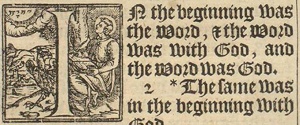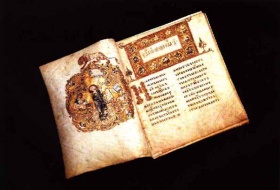John 1:1
From Textus Receptus
(→Foreign Language Translations) |
(→Foreign Language Translations) |
||
| Line 65: | Line 65: | ||
==Foreign Language Translations== | ==Foreign Language Translations== | ||
[[Image:John_1_1_complutensian_polyglot_Latin.JPG|200px|thumb|right|[[John 1:1]] in the Latin [[Complutensian Polyglot]]]] | [[Image:John_1_1_complutensian_polyglot_Latin.JPG|200px|thumb|right|[[John 1:1]] in the Latin [[Complutensian Polyglot]]]] | ||
| + | |||
| + | ====Arabic==== | ||
====French==== | ====French==== | ||
* [[1910 AD|1910]] In the beginning was the Word and the Word was with God and the Word was God. (Segond) | * [[1910 AD|1910]] In the beginning was the Word and the Word was with God and the Word was God. (Segond) | ||
| + | |||
| + | ====Italian==== | ||
====Latin==== | ====Latin==== | ||
| Line 83: | Line 87: | ||
* В началѣ бѣ слово и слово бѣ къ Богу и Бог бѣ слово (Church Slavonic) | * В началѣ бѣ слово и слово бѣ къ Богу и Бог бѣ слово (Church Slavonic) | ||
| + | |||
| + | ====Spanish==== | ||
===Versions agreeing with the KJV=== | ===Versions agreeing with the KJV=== | ||
Revision as of 10:17, 30 September 2010
John 1:1 In the beginning was the Word, and the Word was with God, and the Word was God.
Contents |
Theology
The phrase "the Word" (a translation of the Greek word "Logos") refers to Jesus, as indicated in other verses later in the same chapter. This verse set the stage for later developments in Trinitarian theology and Christology. It clearly demonstrates that the Son has eternal pre-existence with the Father.
Of the Gospels, John has the highest Christology. Here Jesus is the only begotten Son of God, the Way, the Truth, the Life, the True Vine, etc. In 1:1, John identifies Jesus as the Logos, that which made the existence of the created world possible.
Gordon Clark a Calvinist theologian and expert on pre-Socratic philosophy, famously translated Logos as "Logic": "In the beginning was the Logic, and the Logic was with God and the Logic was God." He meant to imply by this translation that the laws of logic were contained in the Bible itself and were therefore not a secular principle imposed on the Christian worldview.
Following Jesuit translations of the 18th Century, today most Chinese Bible translations use the word "Tao" in John 1:1 to translate "Logos", following the use as "Idea" in Taoism.
In unitarian Christology there are other interpretations of John 1:1. In the commentaries on John ch.1 by Lelio Sozzini (Zurich, c.1559) and his nephew Fausto Sozzini (Lyons, c.1562) the "word" being "made flesh" is taken as a reference to the virgin birth, and not to the personal pre-existence of Christ. The passages in the New Testament referring to the Logos were explained by Fausto Sozzini as relating to the foreknown work of Christ as the author of the new creation, not as relating to the "old" Genesis creation.[28] Fausto Sozzini aimed to "completely de-Platonize" the reading of John 1:1-15.
Patristic quotes
Christian apologist Justin Martyr (c 150) identified Jesus as the Logos:
- I shall give you another testimony, my friends, from the Scriptures, that God begot before all creatures a Beginning, [who was] a certain rational power [proceeding] from Himself, who is called by the Holy Spirit, now the Glory of the Lord, now the Son, again Wisdom, again an Angel, then God, and then Lord and Logos; (Justin Martyr, Dialogue with Trypho, Chapter 61.)
Greek
Textus Receptus
- 1514 Ἐν ἀρχῇ ἦν ὁ λόγος, καὶ ὁ λόγος ἦν πρὸς τὸν Θεόν, καὶ Θεὸς ἦν ὁ λόγος. (Complutensian Polyglot)
- en arche en ho logos kai ho logos en pros ton theon kai theos en ho logos. Textus Receptus transliteration
Other Greek

- 1869 Ἐν ἀρχῇ ἦν ὁ λόγος, καὶ ὁ λόγος ἦν πρὸς τὸν Θεόν, καὶ Θεὸς ἦν ὁ λόγος. (Tischendorf - Editio Octava Critica Maior)
English Translations
- 1560 In the beginning was the Worde, and the Worde was with God and that Worde was God. (Geneva Bible)
- 1568 In the beginning was the Word, & the Word was with God, and that Word was God. (Bishops' Bible)
- 1611 In the beginning was the Word, & the Word was with God, and the Word was God. (King James Version)
- 1898 In the beginning was the Word, and the Word was with God, and the Word was God.(Young's Literal Translation)
- 1999 In the beginning was the Word, and the Word was with God, and the Word was God. (American King James Version)
- 1901 In the beginning was the Word, and the Word was with God, and the Word was God. (American Standard Version)
Foreign Language Translations
Arabic
French
- 1910 In the beginning was the Word and the Word was with God and the Word was God. (Segond)
Italian
Latin
- in principio erat Verbum et Verbum erat apud Deum et Deus erat Verbum (Vulgate)
Russian
The first translation of this type in the Slavic language translators implemented the Holy Scriptures of Saints Constantine-Cyril the Philosopher and his brother Methodius.
- Ен архэ̃ь э̃н ъо Ло́гос, ка̀й ъо Ло́гос э̃н про̀с то̀н Тъео́н, ка̀й Тъео̀с э̃н ъо Ло́гос. Russian Transliteration of the Greek
- В началѣ бѣ слово и слово бѣ къ Богу и Бог бѣ слово (Church Slavonic)
Spanish
Versions agreeing with the KJV
ASV, Darby, Douay, EMTV, ERV, KJV21, LO, Noyes, RWebster, WEB, Webster, WEY, Youngs.
Other Mistranslations
- 1 From the first he was the Word, and the Word was in relation with God and was God. (BBE)
- 1 In a beginning was the Word, and the Word was with the God, and a god was the Word. (Diaglot)
- 1 In the beginning the Word already existed. The Word was with God, and the Word was God. (GWV)
- 1 Originally, was, the Word, and, the Word, was, with God; and, the Word, was, God. (Rotterham)
- 1 In the beginning the Word existed; and the Word was face to face with God, yea, the Word was God Himself. (Williams)
Translations by James Moffatt, Hugh J. Schonfield and Edgar Goodspeed render it:
"...and the Word was divine."
Commentaries
See Also
- John 1:1 (NWT) John 1:1 in the New World Translation of the Jehovah's Witnesses


